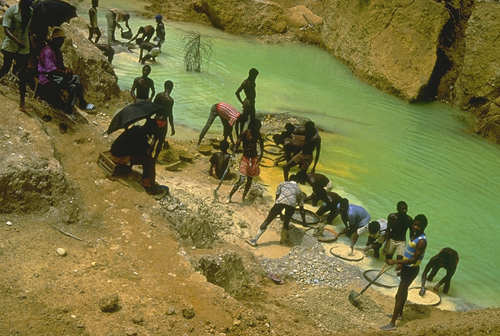
Amputees Bring Conflict in Sierra Leone Home to Congressmen - brought to US by Friends of Sierra Leone
Amputees Bring Conflict in Sierra Leone Home to Congressmen
By Jim Fisher-Thompson Washington File Staff Writer Washington -- The senseless mutilation of innocent civilians in Sierra Leone's nine-year conflict was plainly seen in Congress September 26 as eight victims of forced amputations spoke of their experiences before the House Subcommittee on African Affairs.
House Subcommittee Chairman Ed Royce (Republican of California), addressing a public hearing entitled "Sierra Leone's Youngest Victims: We Can't Ignore," said: "The Sierra Leoneans with us today have experienced unparalleled brutality.
What distinguishes the war in Sierra Leone -- which has been called the most brutal war of the new century -- is the reprehensible tactic of systematic amputations used by the RUF [Revolutionary United Front] rebels, who proudly undertook 'Operation No Living Thing' a few years back." Sitting at the witness table before Royce and his panel were six children and two adults, all grotesquely mutilated by RUF thugs.
They were brought to the United States for the fitting of prosthetic devices by The Friends of Sierra Leone, a non-governmental organization (NGO) established by former Peace Corps volunteers.
Millie Day, president of the group, who addressed the lawmakers, said, "These are very special people," adding, "Let this day be a turning point in the future of Sierra Leone." The unfortunates are among the estimated 20,000 Sierra Leoneans who have had limbs hacked off in the civil war being waged over who will control the diamond-producing areas of the West African nation.
The horror and poignancy of their condition was perhaps best brought home by Tommy Foday, a 47-year-old who leaned forward on the witness table on the stumps of his arms.
Foday told the panel that moments before mutilating him, his RUF attackers told him, "We know you are a driver, so we'll cut off your arms so that you'll never drive again." Asked by Chairman Royce why RUF practiced such terror on innocent civilians, Muctar Jalloh, a 27-year-old student who lost an arm and an ear to rebels, said he thought one reason for their savagery was "because we voted for a democratically elected government." He said that sometimes after committing their atrocities rebels would say: "Now go to the U.N.
[United Nations].
They will provide limbs for you." Jalloh, speaking through an interpreter, said that Sierra Leone's war "is not tribal and it is not religious.
It is, simply, largely a war over control of diamonds -- little pieces of rock that people around the world like to wear on their fingers and hang from their ears.
As you can see, because of these rocks I no longer have an ear or five of my fingers." Saying he was not a politician, Jalloh added: "I am here to ask you to do everything in your power to protect the youngest and most innocent of God's creation from this terrible manifestation of man's worst greed.
For if you allow this new form of systematic and widespread terrorism to be tolerated in Sierra Leone, it can happen again in some other country in the future." Asked if his people wanted the U.N. peacekeeping force, now numbering about 13,000 troops, in Sierra Leone, Jalloh said: "Absolutely.
They've done a very good job.
We welcome them." For House International Relations Committee Chairman Ben Gilman, who also attended the hearing, the Sierra Leoneans embodied "the power and resilience of the human spirit.
These children have been shockingly abused and yet their will and their joy for life remain intact.
Let us learn from them to see their world as it is, rather than as we might wish it to be, for it is our world as well.
Let us leave for others the high-sounding rhetoric of paper-thin peace accords and the so-called 'mainstreaming' of rebel leaders, that instead we may recognize the horror that continues to haunt their land." The unfathomable cruelty of the RUF atrocities also could be seen in the injuries they inflicted on two four-year-olds whose heads were barely visible above the witness table.
Memunatu Mansaray was just 2-1/2 when she encountered RUF troops, who cut off her arm in the town of Kissy, during RUF's January 1999 invasion of Freetown.
Her companion, Mohamed Conteh, had his left leg and right foot cut off by the rebels.
The sight provoked Senator John Kerry to say: "Every American should take note of what is taking place here today.
The thuggery and sheer barbarism of what is happening [in Sierra Leone] ought to steer everyone to work to bring it to an end." The United States is the largest single donor of humanitarian aid to Sierra Leone.
Between 1991 and 1998, it provided more than $254 million in food, medical, and shelter assistance to those who were victims of the conflict.
In fiscal year 1999, the U.S.
government furnished almost $35 million in assistance, including funding for a nationwide child tracing and assistance program.
The United States government has been in the political forefront as well, bringing the Sierra Leonean crisis to the special attention of the U.N.
Security Council, which voted to send a peacekeeping force to enforce provisions of a peace accord signed by RUF and the Sierra Leone government in Lome last year.
The United States has also undertaken a partnership with the Nigerian government to train and equip as many as five battalions of African ground forces to be used as a peace-building force in the embattled nation.
Also present at the hearing were student representatives from St.
James and John School in the city of Baltimore, which raised $1,400 to help pay for the Sierra Leoneans' air travel to the United States for medical treatment.
(The Washington File is a product of the Office of International Information Programs, U.S.
Department of State.
Web site: http://usinfo.state.gov)